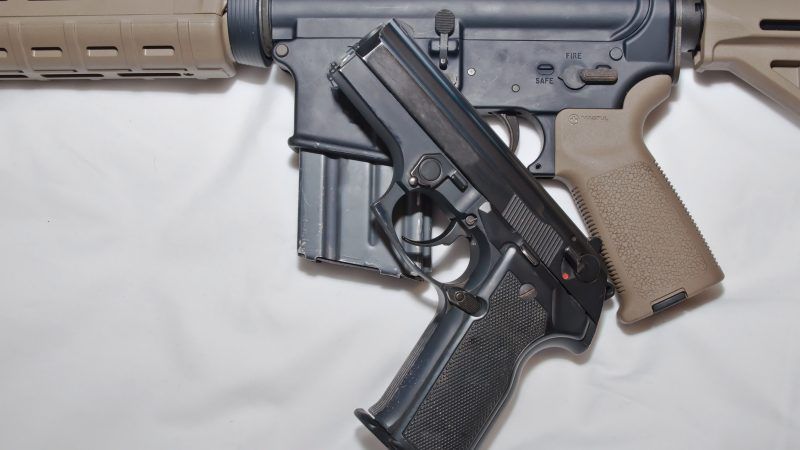Sheriffs Say They Won't Enforce New Washington Law Raising Gun Purchase Age to 21
The new law says that someone buying a semi-automatic rifle has to be at least 21, pass a stricter background check, take a safety training course, and complete a 10-day waiting period.

Washington state has raised its minimum age for purchasing a semi-automatic rifle to 21, along with other new rules governing gun ownership. The age restriction went into effect in January, with the other changes taking effect July 1. But some in state law enforcement have vowed not to enforce the measure, arguing that it violates the Second Amendment.
Under the new law, someone buying a semi-automatic rifle has to be at least 21 years old, pass a stricter background check, take a safety training course, and complete a 10-day waiting period. The law does not impose a retroactive ban on people under 21 owning such guns, but it does increase the restrictions on where they can possess them. Washingtonians under 21 can only have a gun in their homes, in a fixed place of business, or on real property under their control.
And people of all ages are supposed to comply with strict new storage requirements. "A person who stores or leaves a firearm in a location where the person knows, or reasonably should know, that a prohibited person may gain access to the firearm" is now "guilty of community endangerment due to unsafe storage of a firearm" if "a prohibited person" accesses the gun and uses it. This requirement has been met with heavy backlash, with critics pointing out the potentially dangerous consequences of making weapons more inaccessible in a life-threatening situation.
While the new law stipulates that nothing in it "mandates how or where a firearm must be stored," it also says that the only way to surely avoid unsafe-storage penalties is through either "secure gun storage" or "a trigger lock or similar device that is designed to prevent the unauthorized use or discharge of the firearm." Secure gun storage is defined as a "locked box, gun safe, or other secure locked storage space designed to prevent unauthorized use or discharge of a firearm."
Gun sellers say they saw a spike in sales before the new law went into effect. Tiffany Teasdale, owner of Lynwood Gun, told the Seattle-based radio host Jason Rantz that her store sold over 400 guns in 3 days.
"People start doing what we call panic buying," Teasdale said. "They will normally buy 1–2 firearms a year and all of the sudden they are buying 15 in a month."
Sheriffs across the state have denounced the law, saying it is harmful to the people they are sworn to protect by making it harder for them to defend themselves. Some go further, declaring that they will not enforce it.
Bob Songer, a sheriff in Klickitat County, told KTTH: "I understand there's an argument that a sheriff has to follow the rule of law, and I would say generally that's true, unless I feel as an elected sheriff, I have the authority and right to protect the rights of the citizens of Klickitat county that I serve."
The Spokesman Review reports that Stevens County Sheriff Brad Manke and his deputies "won't be issuing citations or making custodial arrests for most suspected violations, short of an obviously mentally ill person under 21 displaying a semi-automatic rifle in a dangerous manner."
"When my 19-year-old daughter can't carry a .22 rifle off our property but we can send her off to war—I don't agree with that at all," Manke told the Chinook Observer.
In February, Washington Attorney General Bob Ferguson stated that sheriffs who do not enforce the law will be held liable if a prohibited person obtains a gun because of the lawmen's inaction.
"In the event a police chief or sheriff refuses to perform the background check required by Initiative 1639, they could be held liable if there is a sale or transfer of a firearm to a dangerous individual prohibited from possessing a firearm and that individual uses that firearm to do harm," Ferguson said.
Sheriffs are not the only ones objecting to the new law. "If the age that you can fight and die for our country is 18 years old, then you should be allowed to purchase your own gun at 18," says Olivia Johnston, a junior at Gonzaga University. "This new law prohibits the right to defend yourself with a gun."
In September of last year, California Gov. Jerry Brown signed similar legislation raising the minimum age for rifle and shotgun purchases to 21. The Second Amendment rights groups Calguns Foundation and Firearms Policy Coalition are now suing California over that law. John Dillon, an attorney representing the groups, told the Los Angeles Times that when people turn 18 they are legally considered adults and should be able to benefit from the same rights other adults have. "Law-abiding adults are entitled to fully exercise all of their fundamental rights, including their 2nd Amendment right to keep and bear arms for all lawful purposes, not just hunting or sport," Dillon said.
On the federal level, President Donald Trump said last year that he would give "serious thought" to raising the minimum age for all gun sales to 21.


Show Comments (148)